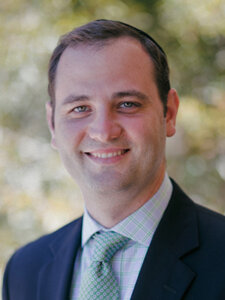Why We Need Yeshiva University

Graphic by Angelie Zaslavsky
The Jewish community needs Yeshiva University. For many years, this claim would have been considered uncontroversial within the Orthodox Jewish community. Orthodox Jewish students needed a place where they could pursue their religious education comfortably while earning undergraduate degrees — and the structure of the Y.U. curriculum undeniably afforded students this opportunity.
But Y.U.’s rash of bad press has led some to question whether the institution is truly a necessary feature of the Jewish communal landscape. Revelations regarding alleged past sexual abuse at Y.U. combined with the recently disclosed “substantial deficits” facing the university can do that to public perception.
However, these disturbing and unfortunate revelations cannot unsettle the following reality about Orthodox Jewish communal life in the United States. In the coming years and decades, institutions within the Jewish community will have to tackle a challenging set of problems — everything from emerging technologies, to 21st-century education, to social justice, to the role of Jewish law in the 21st century — and hundreds of other problems we haven’t even contemplated yet.
And while we don’t know the full contours of the challenges ahead, there is one thing we do know: Institutions don’t run themselves; they run on the most essential piece of the Orthodox Jewish community’s infrastructure: human capital. So the question we need to ask ourselves is, how do we sustain the creation of human capital committed to meeting the next wave of communal challenges? While the answer to the question surely requires a range of strategies about how we educate and motivate the next generation, it also requires that we recognize the following: Yeshiva University may very well be the No. 1 producer of human capital bolstering the Orthodox Jewish community’s infrastructure.
Traditionally, we have thought of Y.U.’s infrastructural role at its most basic. The school produces graduates who serve as rabbis and teachers, filling our synagogues and schools. That relationship has grown as Y.U. produces more and more graduates who play multifaceted communal lay leadership roles — from board members, to advisers, to consultants.
But maybe the most important contribution Y.U. makes to our communal infrastructure is the human capital to jumpstart new institutions that can meet the next wave of communal challenges. Organizations across the Orthodox ideological spectrum — from the Beth Din of America to the Organization for the Resolution of Agunot and to Nishmat’s Yoatzot Halacha program — have emerged as significant contributors to the future of the Jewish community, only with an influx of Y.U, graduates who are dedicated to providing innovative solutions to complex problems at the nexus of Jewish tradition and contemporary realities. Even an institution like Yeshivat Chovevei Torah — typically seen as a Y.U, competitor — emerged as the innovative brainchild of Y.U. graduates.
It is far from surprising that Y.U. graduates play this central role. The students who enroll in Y.U.’s undergraduate programs are fully aware of the commitments required by a robust — and, at times, grueling — dual curriculum. Not surprisingly, students willing to dedicate much of their undergraduate studies to learning about their tradition are those also likely to dedicate their lives to the cause of the Jewish community. And it is this stream of highly motivated and committed individuals that we need to tap collectively if we are to maintain the institutional infrastructure necessary for sustaining a vibrant Jewish community.
To make this point, consider a world without Y.U. graduates. As a proud graduate of the institution, I worry about such a world, and not just because of what it would mean for my community in particular. (As an aside, it would mean losing the rabbis of three of the four largest Orthodox synagogues, two of the three Orthodox high school principals and broad swaths of board members of core community institutions.) I worry because such a catastrophic state of affairs is just the beginning. A world without Y.U. graduates is one in which most of the institutions that will ensure Jewish continuity for my children and grandchildren simply won’t be thought up — and that is a reality too depressing to contemplate.
Which is why the Jewish community needs Yeshiva University.
Michael A. Helfand is an associate professor at the Pepperdine University School of Law and is the associate director of Pepperdine University’s Diane and Guilford Glazer Institute for Jewish Studies. His wife currently serves as Yeshiva University’s Director of the West Coast Region, and he himself was a graduate of Yeshiva College in 2002.





















